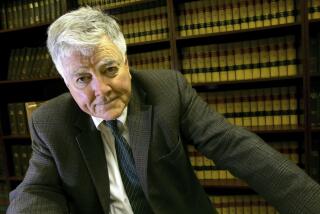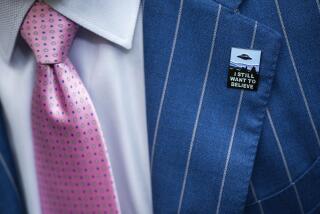McCloskey Blasts Count of Viet Cong at CBS Libel Trial
- Share via
NEW YORK — Former California Rep. Paul N. McCloskey testified Monday at Gen. William C. Westmoreland’s $120-million libel trial against CBS that he considered it “almost criminal” for Viet Cong self-defense forces not to have been counted in intelligence reports at the height of the Vietnam War.
The one-time Marine Corps officer, who gained political prominence as a Vietnam War critic and brief candidate for the 1972 GOP presidential nomination, based the assertion on his belief that the Viet Cong irregulars at times caused as many American casualties as did the North Vietnamese armed forces.
“I thought it was almost criminal,” he said, “to say these people were not a threat.”
The exclusion of the self-defense forces from official counts of enemy forces has become one of the major battlefronts in the lawsuit.
In its 1982 documentary, “The Uncounted Enemy: A Vietnam Deception,” the network accused Westmoreland of a conspiracy to produce misleading estimates of enemy troop strength in the months just before the January, 1968, Tet offensive.
McCloskey’s name surfaced in the case because Sam Adams, a former CIA analyst, had taken secret CIA cables to the congressman’s office in 1973 and asked McCloskey to keep them for him.
The stack of documents, which McCloskey kept for two years, included cables from Gen. Creighton W. Abrams, who was Westmoreland’s deputy, and Robert Komer, who was then chief of the Johnson Administration’s Vietnam pacification program.
Calling the cables dealing with elimination of enemy self-defense forces “shocking,” McCloskey said he told Adams, “The cables explained the difference between what we had been told in Saigon in 1967 and what we saw in the fields.”
Adams who is a co-defendant in the case, quit the CIA in 1973. Afterwards he began to write a book contending that enemy troop figures had been “cooked” by Westmoreland’s Vietnam command, and he later was a paid consultant on the contested 90-minute documentary.
When he left the CIA, Adams testified earlier, he buried secret documents in garbage bags on his Virginia farm and took other copies to McCloskey.
Adams returned to McCloskey’s office for the documents about two years later, and shortly thereafter McCloskey made a House speech saying Adams feared being executed if his views about the intelligence controversy were known.
Under cross-examination by Westmoreland attorney David Dorsen, McCloskey acknowledged Monday that Adams had never used the term “executed,” but said the former CIA expert on Viet Cong troop strength “felt when he came to me that his superiors were opposed to his views . . . his fear was that he was confronting the head of government.”
After closely questioning McCloskey about his background as a Marine reserve officer who had studied guerrilla warfare and counterinsurgency, U.S. District Judge Pierre N. Leval permitted him to testify concerning his own observations in Vietnam during his years in Congress.
McCloskey told the jury he had gone to Vietnam within days after he took his congressional oath in December, 1967, and that officers in Westmoreland’s command told him the enemy no longer had the capability to mount a large scale offensive.
But he said when he went out of Saigon, American troops and young officers in the field told him that enemy strength was being underestimated and that reports of enemy troops killed were being exaggerated.
Westmoreland insisted in the CBS broadcast and during the trial that the self-defense forces represented no military threat. He heatedly and repeatedly denied they were removed in order to keep enemy force levels beneath an arbitrary ceiling.
CBS attorneys called two former CIA analysts to the stand last Tuesday and they testified they believed Westmoreland’s command had badly underestimated the enemy camp.
John E. Dickerson, now a Denver businessman, testified that after mid-1967 when CIA analysts in Westmoreland’s command in Saigon were in a bitter dispute over enemy strength estimates, CIA analysts were cut off from briefings and information they had routinely received before.
Leval interrupted testimony twice on Monday to remind the jury that the question it must decide is not whether the military command’s estimates were accurate, but whether they were honest.
More to Read
Get the L.A. Times Politics newsletter
Deeply reported insights into legislation, politics and policy from Sacramento, Washington and beyond. In your inbox twice per week.
You may occasionally receive promotional content from the Los Angeles Times.










